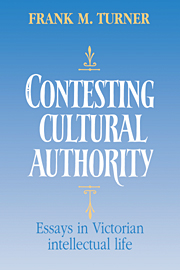Book contents
- Frontmatter
- Contents
- Preface
- I SHIFTING BOUNDARIES
- 1 The religious and the secular in Victorian Britain
- 2 Cultural apostasy and the foundations of Victorian intellectual life
- 3 The crisis of faith and the faith that was lost
- 4 The secularization of the social vision of British natural theology
- II SCIENCE AND THE WIDER CULTURE
- III MODERNS AND ANCIENTS
- Index
1 - The religious and the secular in Victorian Britain
Published online by Cambridge University Press: 22 September 2009
- Frontmatter
- Contents
- Preface
- I SHIFTING BOUNDARIES
- 1 The religious and the secular in Victorian Britain
- 2 Cultural apostasy and the foundations of Victorian intellectual life
- 3 The crisis of faith and the faith that was lost
- 4 The secularization of the social vision of British natural theology
- II SCIENCE AND THE WIDER CULTURE
- III MODERNS AND ANCIENTS
- Index
Summary
During the 1880s R. W. Dale, the leading British Congregationalist clergyman of his day, published an essay entitled, ‘Every-day business a divine calling’. Portraying the world as the creation of God in which the divine will was to be realized through all vocations, Dale observed, ‘It is convenient, no doubt, to distinguish what is commonly described as “secular” from what is commonly described as “religious”. We all know what the distinction means. But the distinction must not be understood to imply that in religious work we are doing God's will, and that in secular work we are not doing it.‘ Dale thus rejected boundaries in the conceptualization of social life that might have permitted his contemporaries to shy away from particular moral duties. As a Christian minister, Dale was unwilling to allow the members of his prosperous middle-class Birmingham congregation or his readers to divide their lives into conveniently distinct religious and secular arenas in which the values of the former did not inform the activities of the latter. Religious convictions were to result in civic action as well as in personal morality and piety.
For much of this century historians of Victorian intellectual and social life have had difficulty accommodating themselves to figures such as Dale and have resisted such rejection of boundaries between religious and secular activity.
- Type
- Chapter
- Information
- Contesting Cultural AuthorityEssays in Victorian Intellectual Life, pp. 3 - 37Publisher: Cambridge University PressPrint publication year: 1993
- 3
- Cited by



